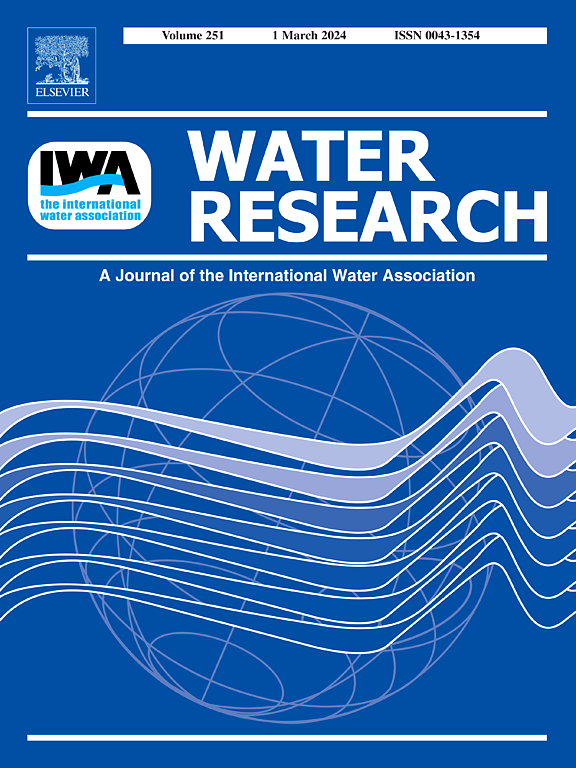多代暴露揭示了海洋变暖时间情景对海洋桡足动物汞毒性的不同影响
IF 12.4
1区 环境科学与生态学
Q1 ENGINEERING, ENVIRONMENTAL
引用次数: 0
摘要
几代人以来,海洋生物群一直面临着海洋变暖和汞污染的共同压力。然而,不同的变暖的时间情景是否以及如何影响生物体中的汞毒性仍然知之甚少。在此,我们进行了多代实验(F1−F5),研究了三种变暖情景(发育、逐步和未来)对海洋桡足类伪南达雷(Pseudodiaptomus annandalei)汞毒性(1 μg/L)的影响。结果表明,所有三种变暖情景都增加了汞处理的桡足类动物的汞积累,从而加剧了汞毒性,未来变暖情景下的毒性反应最为严重。表型性状分析表明,与环境温度相比,三种增温情景显著降低了水杨花的繁殖力和放牧率,缩短了水杨花的发育时间,最终影响了种群的适合度。我们进一步整合了F5桡足类的转录组学和蛋白质组学分析。结果表明,三种变暖情景均降低了能量产生和解毒防御,其中未来变暖情景下的分子反应最为明显,为不同变暖情景下汞毒性增加提供了机制理解。总体而言,我们的发现突出了不同变暖情景对海洋桡足类汞毒性的重大风险,并提供了在现实的、时间动态情景下对多应力相互作用(即气候变化和金属污染)的全面理解。本文章由计算机程序翻译,如有差异,请以英文原文为准。


Multigenerational exposure reveals differential effects of ocean warming temporal scenarios on mercury toxicity in a marine copepod
Marine biota have been facing co-occurring stressors of ocean warming and mercury pollution for generations. However, whether and how different temporal scenarios of warming will affect mercury toxicity in organisms remain poorly understood. Here, we conducted a multigenerational experiment (F1−F5) to investigate the effects of three warming scenarios (developmental, stepwise, and future) on mercury toxicity (1 μg/L) in the marine copepod Pseudodiaptomus annandalei. The results showed that all three warming scenarios increased mercury accumulation in mercury-treated copepods, thereby exacerbating mercury toxicity, with the most severe toxicity response under future warming. Our phenotypic trait analysis showed that the three warming scenarios significantly decreased fecundity and grazing rate, while shortening the development time of mercury-treated P. annandalei compared to ambient temperature condition, ultimately compromising its population fitness. We further integrated transcriptomic and proteomic analyses for the copepods of F5. The findings indicated that the three warming scenarios decreased energy production and impaired detoxification defense, with the most pronounced molecular response occurring under future warming, providing a mechanistic understanding about increased mercury toxicity under different warming scenarios. Overall, our finding highlights the significant risk of different warming scenarios on mercury toxicity in marine copepods and provides a comprehensive understanding of multistress interaction, i.e., climate change and metal pollution, under realistic, temporally dynamic scenarios.
求助全文
通过发布文献求助,成功后即可免费获取论文全文。
去求助
来源期刊

Water Research
环境科学-工程:环境
CiteScore
20.80
自引率
9.40%
发文量
1307
审稿时长
38 days
期刊介绍:
Water Research, along with its open access companion journal Water Research X, serves as a platform for publishing original research papers covering various aspects of the science and technology related to the anthropogenic water cycle, water quality, and its management worldwide. The audience targeted by the journal comprises biologists, chemical engineers, chemists, civil engineers, environmental engineers, limnologists, and microbiologists. The scope of the journal include:
•Treatment processes for water and wastewaters (municipal, agricultural, industrial, and on-site treatment), including resource recovery and residuals management;
•Urban hydrology including sewer systems, stormwater management, and green infrastructure;
•Drinking water treatment and distribution;
•Potable and non-potable water reuse;
•Sanitation, public health, and risk assessment;
•Anaerobic digestion, solid and hazardous waste management, including source characterization and the effects and control of leachates and gaseous emissions;
•Contaminants (chemical, microbial, anthropogenic particles such as nanoparticles or microplastics) and related water quality sensing, monitoring, fate, and assessment;
•Anthropogenic impacts on inland, tidal, coastal and urban waters, focusing on surface and ground waters, and point and non-point sources of pollution;
•Environmental restoration, linked to surface water, groundwater and groundwater remediation;
•Analysis of the interfaces between sediments and water, and between water and atmosphere, focusing specifically on anthropogenic impacts;
•Mathematical modelling, systems analysis, machine learning, and beneficial use of big data related to the anthropogenic water cycle;
•Socio-economic, policy, and regulations studies.
 求助内容:
求助内容: 应助结果提醒方式:
应助结果提醒方式:


